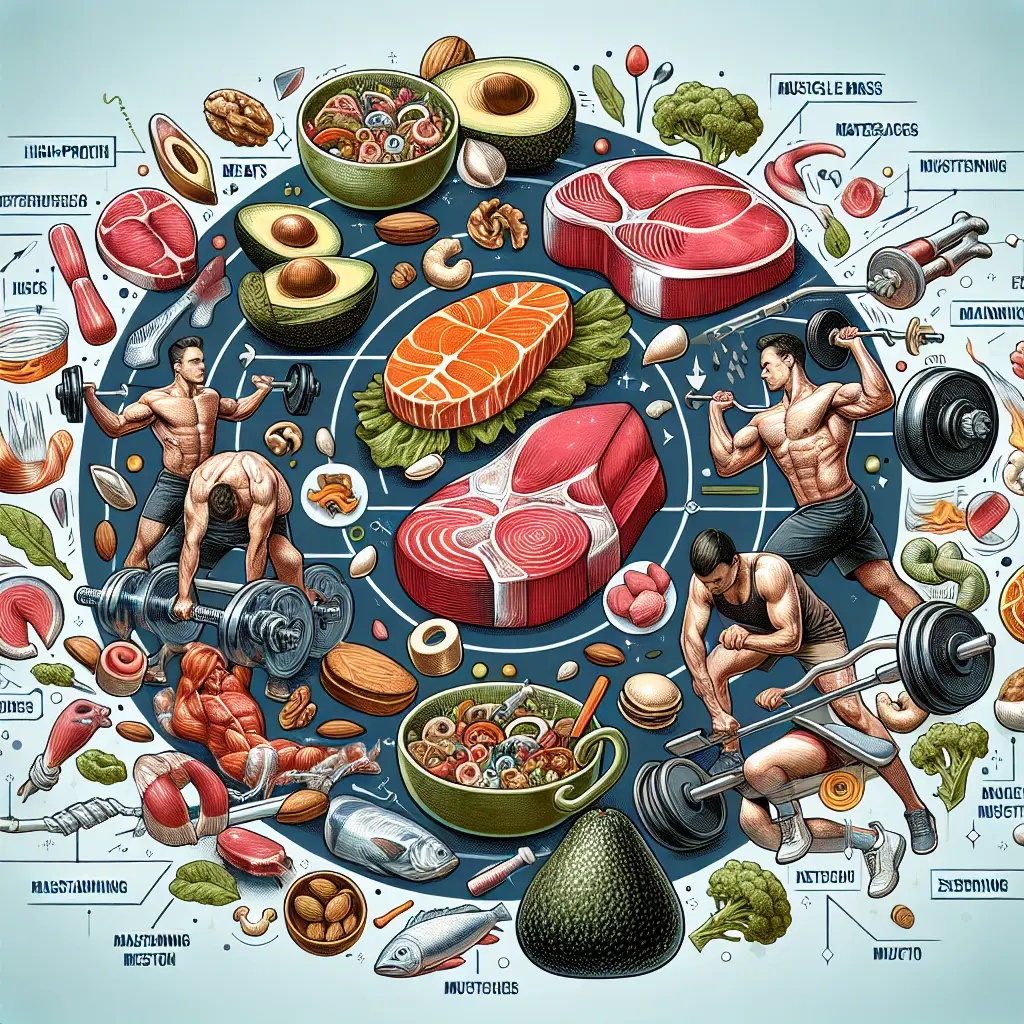
In the ever-evolving landscape of fitness and nutrition, maintaining muscle mass while following a ketogenic diet has become a topic of great interest for athletes and fitness enthusiasts. The ketogenic diet offers significant benefits, such as fat loss and energy stabilization, but maintaining muscle mass on keto requires a strategic approach. Below, we delve into practical strategies, insights from recent studies, and expert tips to help you achieve your muscle-building goals while embracing a ketogenic lifestyle.
Understanding the Keto Diet and Muscle Maintenance
The ketogenic diet is characterized by a high-fat, moderate-protein, and low-carbohydrate intake. This macronutrient distribution shifts the body into a state of ketosis, where fats become the primary energy source. For those looking to maintain muscle on keto, it’s crucial to ensure adequate protein intake and engage in strength training.
Optimizing Protein Intake
Protein is essential for muscle repair and growth. Recent studies have shown that leucine and ketoisocaproic acid (KIC), both components of branched-chain amino acids, play significant roles in muscle protein synthesis (source: PubMed). While the benefits of leucine are well-documented, it is important to monitor its impact on insulin signaling, especially in insulin-resistant individuals.
Tip: Aim for a daily protein intake of 1.6 to 2.2 grams per kilogram of body weight to support muscle retention and growth on a ketogenic diet. Focus on high-quality sources such as grass-fed beef, chicken, fish, and eggs.
Embracing Keto Diet Strength Training
To preserve muscle mass, resistance training should be a cornerstone of your fitness regimen. Incorporating keto workout muscle gain exercises can help maintain muscle size and strength.
Tip: Engage in compound movements like squats, deadlifts, and bench presses, which target multiple muscle groups. Consider adding resistance bands or free weights to increase intensity.
Innovative Approaches to Keto Nutrition
Maintaining muscle mass on keto isn't just about lifting weights; it's also about smart nutrition choices that support your goals.
Exploring New Recipes: Avocado Brownies
Integrating innovative recipes such as avocado brownies can help satisfy sweet cravings while staying within macro limits. These brownies offer healthy fats and antioxidants without excessive carbohydrates (source: Chocolate Covered Katie).
Tip: Experiment with low-carb desserts to keep your diet enjoyable and sustainable.
Supplementing with Psyllium
Psyllium husk is gaining attention for its digestive health benefits and potential role in weight management (source: Healthline). While not directly linked to muscle maintenance, psyllium can enhance gut health, which is crucial for nutrient absorption.
Tip: Consider adding psyllium to your daily routine for improved digestion and satiety.
Addressing Health Concerns
A well-rounded approach to keto diet muscle retention also involves being mindful of health implications.
Managing Cholesterol Levels
Recent research highlights an increase in LDL cholesterol levels among those following a ketogenic diet (source: Medical News Today). While this may raise concerns, it is essential to differentiate between LDL subtypes.
Tip: Regularly monitor cholesterol levels and consider incorporating omega-3 rich foods like salmon and walnuts to support heart health.
Pancreatic Cancer Insights
Intriguingly, studies suggest that a ketogenic diet may play a role in starving pancreatic cancer cells when combined with specific therapies (source: ScienceDaily). While these findings are preliminary, they underscore the potential broader benefits of ketosis beyond weight management.
Tailored Approaches for Diverse Needs
Whether you aim for keto diet lean muscle or substantial gains, tailoring your approach based on individual needs is vital.
The Manosphere’s Diet Influence
An emerging trend within the fitness community is the manosphere’s animal-based diet, which emphasizes high-protein meals (source: Men's Health). While this approach aligns with keto principles, it’s important to balance red meat consumption due to its association with increased type 2 diabetes risk (source: Harvard Health).
Tip: Diversify protein sources by including poultry, fish, and plant-based proteins like tofu to mitigate health risks while maintaining dietary variety.
The Role of Apolipoprotein B Testing
New insights suggest that apolipoprotein B testing may provide a more accurate measure of heart disease risk compared to traditional lipid panels (source: American Heart Association). This is particularly relevant for those on a high-fat ketogenic diet.
Tip: Consult with healthcare professionals to assess heart disease risk through comprehensive testing methods.
Conclusion: Achieving Muscle Retention on a Keto Diet
Successfully maintaining muscle mass while following a ketogenic diet involves a strategic blend of nutrition, exercise, and health management. Here’s a recap of the essential strategies discussed:
Optimize Protein Intake:
- Aim for 1.6 to 2.2 grams of protein per kilogram of body weight.
- Prioritize high-quality protein sources such as grass-fed beef, chicken, fish, and eggs.
Incorporate Strength Training:
- Engage in compound movements like squats, deadlifts, and bench presses.
- Use resistance bands or free weights to boost workout intensity.
Innovative Nutrition Approaches:
- Experiment with recipes like avocado brownies to stay within macro limits while satisfying cravings.
- Consider psyllium husk for enhanced digestion and nutrient absorption.
Monitor Health Concerns:
- Regularly check cholesterol levels and explore omega-3 rich foods to support heart health.
- Stay informed about potential broader benefits of ketosis, such as its role in cancer therapy research.
Tailor Your Approach:
- Balance protein sources to mitigate health risks and diversify dietary intake.
- Utilize advanced testing methods like apolipoprotein B for accurate heart disease risk assessment.
Embracing these strategies can harmonize your keto lifestyle with muscle retention goals, ensuring that your efforts in the gym and kitchen yield the desired results. Always remember that individual needs vary; therefore, customizing your approach based on personal health conditions and fitness objectives is crucial.
As you embark on this journey towards optimal muscle health on a keto diet, I encourage you to share your experiences and insights. How have these strategies impacted your fitness journey? Your thoughts could inspire others in the community striving for similar goals.
Feel empowered to take these actionable tips and transform your ketogenic experience into one that not only supports muscle retention but also enhances overall well-being. Keep exploring, adapting, and thriving on your path to superior muscle health.
Warm regards,
Anna Westbrook